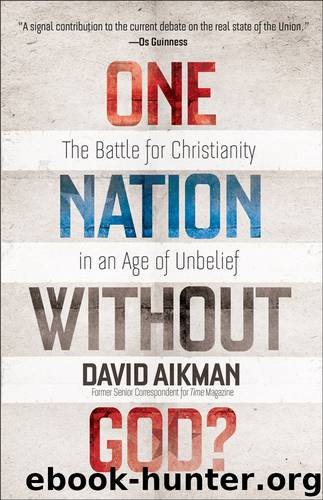One Nation without God? by David Aikman

Author:David Aikman
Language: eng
Format: epub
Tags: REL012110
ISBN: 9781441235848
Publisher: Baker Publishing Group
During the first two millennia of global Christendom, the watershed event was not the official adoption of Christianity by the Roman Empire under the emperor Constantine but the Protestant Reformation launched by the monk and university lecturer Martin Luther in 1517. In that year the thirty-three-year-old wrote a letter (known as The Ninety-Five Theses) to the bishop of Mainz protesting the sale of indulgences (the church’s official remission of time that would otherwise have been spent in purgatory for sins committed) by official representatives of the pope. Luther’s insistence that eternal salvation could not be earned, much less obtained on an installment plan by purchasing indulgences, but must be received by faith, through grace, set Christianity on its most dramatic path of expansion since the early church itself. Luther’s challenge to the authority of the papacy was in due course punished with excommunication from the Roman Catholic Church. Protestantism, however, grew out of Luther’s insistence that eternal salvation for the believer could be received only by God’s grace through faith and without any intervention by the clergy.
The Reformation changed the face of Europe for all time, eventually dividing the continent after decades of brutal wars into regions and nations that were predominantly Protestant or predominantly Catholic. But it was the second stage of the Reformation, the rise of Puritanism in England and then the settlement of North America by committed Puritans, that laid the groundwork for an America that was overwhelmingly Christian in its conviction.
The high point of Christian influence in America may have been in the middle of the nineteenth century. Christianity had blossomed in the highly favorable atmosphere of economic and political freedom, and it probably reached its apogee in America during the Second Great Awakening, generally estimated to have begun at the very end of the eighteenth century and to have lasted at least until about 1850 (though there were important Christian evangelical revivals in the Confederate army during the Civil War and a dramatic urban revival in the north of the United States that began in 1858).
The expression of Christianity at that time was overwhelmingly Protestant right up until the end of the nineteenth century. American Christians often gave the impression to visiting foreigners of being not just Protestant but sometimes specifically anti-Catholic. As immigration from Europe continued to swell in the centuries that followed the Pilgrims of 1620, however, Roman Catholics became increasingly numerous and eager to form an active life of their own in their adopted nation. Between 1830 and 1860, the American population grew from 13 million to 31.5 million, but the Roman Catholic population increased nearly tenfold to 3.1 million. Inevitably, there were clashes between the Protestant and Catholic communities, and there was much ugly prejudice by Protestants against Catholics. Some of it was triggered by papal pronouncements. Pope Gregory XVI, for example, declared in an encyclical in 1832 that the Catholic Church condemned the “absurd and erroneous proposition which claims that liberty of conscience must be maintained for everyone.”[177]
A prominent campaigner against the immigration into the United States of European Catholics was Samuel F.
Download
This site does not store any files on its server. We only index and link to content provided by other sites. Please contact the content providers to delete copyright contents if any and email us, we'll remove relevant links or contents immediately.
| Buddhism | Christianity |
| Ethnic & Tribal | General |
| Hinduism | Islam |
| Judaism | New Age, Mythology & Occult |
| Religion, Politics & State |
Cecilia; Or, Memoirs of an Heiress — Volume 1 by Fanny Burney(31341)
Cecilia; Or, Memoirs of an Heiress — Volume 3 by Fanny Burney(30938)
Cecilia; Or, Memoirs of an Heiress — Volume 2 by Fanny Burney(30896)
The Secret History by Donna Tartt(16643)
Sapiens: A Brief History of Humankind by Yuval Noah Harari(13067)
Leonardo da Vinci by Walter Isaacson(11912)
The Radium Girls by Kate Moore(10914)
Sapiens by Yuval Noah Harari(4546)
The Wind in My Hair by Masih Alinejad(4427)
How Democracies Die by Steven Levitsky & Daniel Ziblatt(4407)
Homo Deus: A Brief History of Tomorrow by Yuval Noah Harari(4287)
Endurance: Shackleton's Incredible Voyage by Alfred Lansing(3852)
The Silk Roads by Peter Frankopan(3771)
Man's Search for Meaning by Viktor Frankl(3644)
Millionaire: The Philanderer, Gambler, and Duelist Who Invented Modern Finance by Janet Gleeson(3574)
The Rape of Nanking by Iris Chang(3522)
Hitler in Los Angeles by Steven J. Ross(3443)
The Motorcycle Diaries by Ernesto Che Guevara(3340)
Joan of Arc by Mary Gordon(3262)
